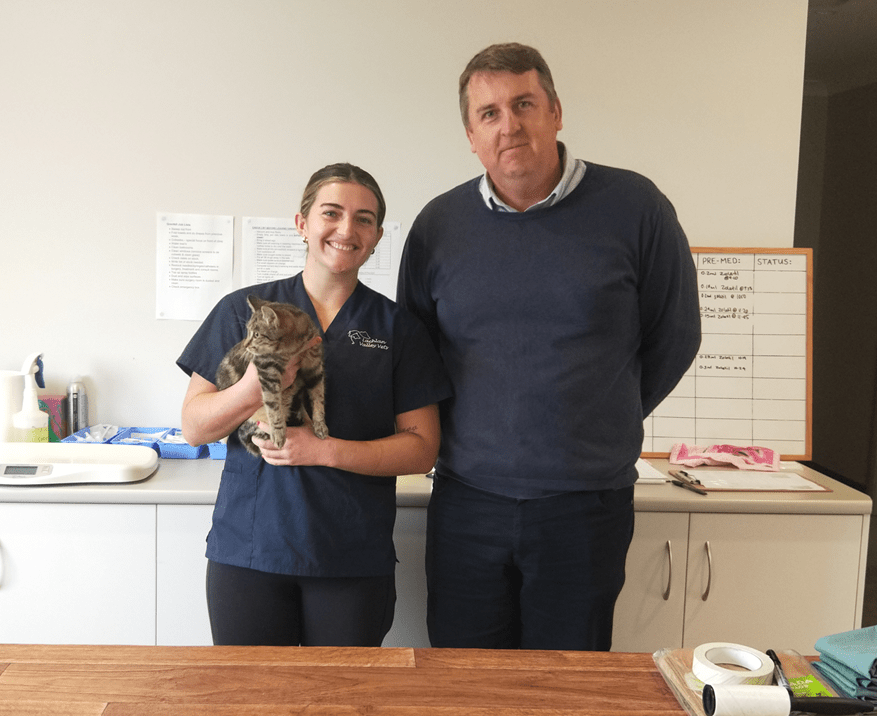The Keeping Cats Safe at Home project, a joint initiative of RSPCA NSW, Weddin Shire Council and Weddin Landcare, assisted by the NSW Government through its Environmental Trust, has reached a new milestone. The four-year program has been hugely successful with the 300th cat desexed in Weddin completed on 6 June at Lachlan Valley Vets in Grenfell.
Photo: Mel Martyn (Veterinarian, Lachlan Valley Vets) and Luke Sheehan (Director of Environmental Services at Weddin Shire Council) with the 300th cat to be desexed as part of KCSAH project.

Following the success of the initial desexing program where 100 cats were desexed by October 2022, the program has continued to gain momentum with RSPCA NSW extending the desexing program for another two years. An additional ten thousand dollars was allocated to continue the free desexing clinics and another ten thousand dollars was allocated for a cat enclosure incentive to further encourage behavioural change and prevent cats from roaming.
Earlier this year, cat owners in the Weddin Shire who have had their cats desexed were eligible to apply for a Catnets enclosure to assist in containing their cat to their property.
‘We received 30 eligible applications for the Catnets enclosure incentive and, with additional funding from the Keeping Cats Safe at Home project, we were able to fund all of these, which is a fantastic result’ Luke Sheehan, Director of Environmental Services at Weddin Shire Council said.
“The milestones and results of this project could not have been achieved without the tireless efforts of our Ranger, Allison Knowles. Allison has worked with local cat owners and carers through the desexing and microchipping process, often picking up cats the day before if transport has been an issue. She also interviewed residents, inspected sites and helped set up 30 cat enclosures across the district” said Luke.
“Lachlan Valley Vets has been outstanding by committing to regular desexing clinics and has made the whole process simple and accessible for our residents” Luke continues.
Accessibility has been a big focus in the project and the free desexing has removed the financial barrier for many residents. Particularly for owners of multiple cats where desexing may not have been an option without this program.
“Cats can produce multiple litters a year, so numbers can get out of control very quickly. The sooner we can get them desexed, when they are old enough, the better. We recommend having them desexed just before they hit puberty, which is at 4 months old” Mel Martyn, Veterinarian, Lachlan Valley Vets.
“Desexing your cat not only reduces health issues from pregnancies and the stress of feeding or rehoming a litter of kittens, but it can have a greater impact by reducing the inclination for your cat to roam. Preventing cats from roaming both increases the safety and well-being of cats and protects our native wildlife” Melanie Cooper, Local Landcare Coordinator said.
“It’s not just your house cat that is eligible. Perhaps you have a farm mouser or stray cat that drops in for a feed from time to time that could benefit from desexing” Melanie continues.
“With the program scheduled to end by January 2025 time is running out to have your cat included in the program. There are regular free desexing and microchipping clinics being held until the end of the year, so we do urge you to consider booking your cat in while there is still funding available” Melanie Cooper said.
To book your cat into the desexing clinic, get in touch with Weddin Shire Ranger Allison Knowles by emailing animalcontrol@weddin.nsw.gov.au or calling 0427 246 787.
